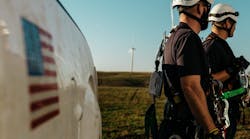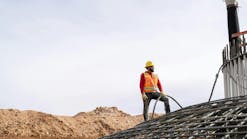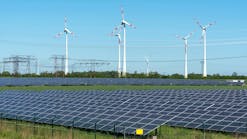Although the COVID-19 pandemic is causing great uncertainty throughout our economy, American wind power rests on a strong foundation as we seek to overcome these challenging times. And AWEA’s just-released Wind Powers America Annual Report 2019 shows just how strong that foundation is. Wind energy is powering more U.S. families and businesses than ever before while providing well-paying jobs, investments in rural America, and a cleaner environment.
Let’s dig into some of the report’s top trends.
WIND SUPPLIES RECORD AMOUNTS OF ENERGY
Wind power became the country’s largest source of renewable energy in 2019, reliably and affordably supplying 7.2 percent of the country’s electricity. In total, wind turbines generated just over 300 terawatt-hours of electricity in 2019, surpassing hydro to become the top renewable energy provider in the country.
At the state level, wind energy hit remarkable highs. Six states—Iowa, Kansas, Maine, North Dakota, Oklahoma, and South Dakota—generated at least 20 percent of their electricity using wind. Iowa and Kansas both surpassed 40 percent wind generation, and more impressively both states generated more electricity from wind power than any other technology.
WIND IS THE PREFERRED CHOICE FOR NEW POWER
Wind power was the number one choice of new utility-scale power generation in 2019, capturing 39 percent of new additions. Natural gas-fired power additions captured 36 percent of the market while utility-scale solar captured 23 percent. Together, renewables, led by wind and solar, constitute 62 percent of new power capacity additions for the year.
Across the country, wind power capacity grew 10 percent as American workers installed 9,137 megawatts (MW) of new wind projects in 2019, making it the industry’s third strongest year on record. The wind industry surpassed the 100 GW milestone, ending the year with just under 106 GW of operating wind power capacity and nearly 60,000 wind turbines. That’s enough wind capacity to power 32 million American homes.
Texas and Iowa, long the country’s wind leaders, both set single year records for new wind installations, building 3,938 MW and 1,739 MW, respectively. South Dakota outpaced all states in terms of wind power capacity growth. The state added 506 MW for a one-year growth rate of 50 percent.
And there’s more on the way. The project pipeline of new wind farms either under construction or in advanced development stands at more than 44 GW. When completed, these projects will supply enough electricity to power an additional 15 million homes.
BUYERS POWER UP WITH WIND
Utilities and corporate buyers set yet another record in 2019, signing over 8,700 MW of new power purchase agreements. Notably, corporate buyers signed 40 percent of these agreements, with Walmart and AT&T being the year’s two largest corporate purchasers. Fourteen first-time buyers made wind purchases in 2019, including companies as diverse as McDonald’s, Estee Lauder and Baker Hughes.
Not to be outdone, utilities continued to be the largest buyers of wind. Large contracts announced by utilities like NIPSCO, National Grid, and Austin Energy pushed utility PPA activity over 5,000 MW for the year. Offshore wind projects added to the trend with National Grid signing a contract to purchase 400 MW from Revolution Wind.
Wind’s popularity is driven in no small part by its competitive economics. Because costs have fallen by 70 percent over the past decade, wind is now the cheapest source of new electricity in many parts of the country.
WIND POWERS RURAL AMERICA
Over 99 percent of wind projects are built in rural America, bringing nearly unmatched investment and economic opportunity. In 2019 alone wind projects paid $1.6 billion in state and local taxes and land lease payments. That gives rural communities that often have small tax bases new revenue to invest in schools, fix roads and fund emergency services. Land lease payments give farmers and ranchers a steady income source that helps them during periods of low crop prices or poor weather, keeping many family farms in the family.
These payments are in addition to the local economic investment driven by $14 billion that developers invested in new wind projects in 2019. These capital investments support economic growth across the country and enable the transition to a cleaner economy.
WIND CREATES WELL-PAYING JOBS IN ALL 50 STATES
Over 120,000 Americans now have well-paying jobs in wind, ranging from manufacturing to construction, operations and maintenance, engineering and more. In fact, wind turbine technician remains the country’s second fastest growing job according to the U.S. Bureau of Labor Statistics, trailing only solar installer. Wind power is also one of the few industries creating new U.S. manufacturing jobs, with over 530 factories in 43 states now building wind turbine components. The men and women who serve our country also find rewarding wind careers, as veterans find wind jobs at a rate 61 percent higher than the average U.S. industry.
U.S. OFFSHORE WIND BUILDS MOMENTUM
Offshore wind experienced enormous progress in 2019. States up and down the East Coast made are now targeting over 25 GW of offshore, and over 26 GW of offshore wind projects are in various stages of development in federal lease areas issued to date. Developers now plan to bring 9 GW of offshore wind online by 2026, creating a new ocean energy resource that will supply clean, reliable power generated in close proximity to many of the country’s largest population centers. Reports show offshore wind could create 83,000 jobs by 2030, and Americans are on board this vision for the future—over 80 percent of people across party lines support offshore wind, according to a recent survey.
WIND POWERS A CLEANER AMERICA
Wind provides all these benefits while being a zero-pollution electricity source, offering further proof we don’t have to choose between a strong economy and a clean environment. As a leading climate change solution, wind avoided 42 million cars’ worth of carbon dioxide emissions in 2019, and it also cut substantial amounts of sulfur dioxide and nitrogen oxides, air pollutants that create smog and trigger asthma attacks. Importantly, especially in drought-prone regions, wind avoided roughly 103 billion gallons of water consumption by thermal power plants last year.
American workers built and impressive 75 GW of wind in the last 10 years, and wind is poised to reach even greater heights over the coming decade. Here’s to the next 100 GW and beyond.
John Hensley authored this article.








